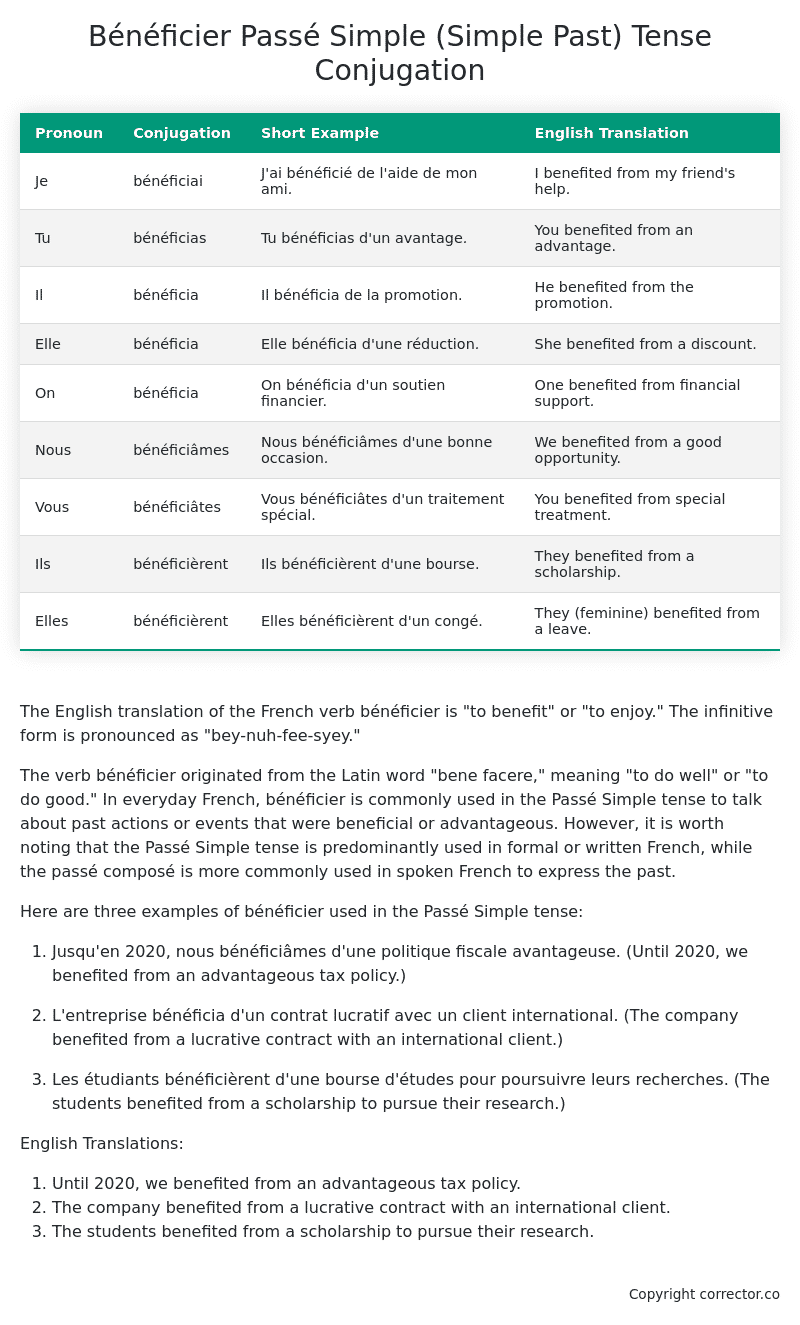Passé Simple (Simple Past) Tense Conjugation of the French Verb bénéficier
Introduction to the verb bénéficier
The English translation of the French verb bénéficier is “to benefit” or “to enjoy.” The infinitive form is pronounced as “bey-nuh-fee-syey.”
The verb bénéficier originated from the Latin word “bene facere,” meaning “to do well” or “to do good.” In everyday French, bénéficier is commonly used in the Passé Simple tense to talk about past actions or events that were beneficial or advantageous. However, it is worth noting that the Passé Simple tense is predominantly used in formal or written French, while the passé composé is more commonly used in spoken French to express the past.
Here are three examples of bénéficier used in the Passé Simple tense:
-
Jusqu’en 2020, nous bénéficiâmes d’une politique fiscale avantageuse.
(Until 2020, we benefited from an advantageous tax policy.) -
L’entreprise bénéficia d’un contrat lucratif avec un client international.
(The company benefited from a lucrative contract with an international client.) -
Les étudiants bénéficièrent d’une bourse d’études pour poursuivre leurs recherches.
(The students benefited from a scholarship to pursue their research.)
English Translations:
- Until 2020, we benefited from an advantageous tax policy.
- The company benefited from a lucrative contract with an international client.
- The students benefited from a scholarship to pursue their research.
Table of the Passé Simple (Simple Past) Tense Conjugation of bénéficier
| Pronoun | Conjugation | Short Example | English Translation |
|---|---|---|---|
| Je | bénéficiai | J’ai bénéficié de l’aide de mon ami. | I benefited from my friend’s help. |
| Tu | bénéficias | Tu bénéficias d’un avantage. | You benefited from an advantage. |
| Il | bénéficia | Il bénéficia de la promotion. | He benefited from the promotion. |
| Elle | bénéficia | Elle bénéficia d’une réduction. | She benefited from a discount. |
| On | bénéficia | On bénéficia d’un soutien financier. | One benefited from financial support. |
| Nous | bénéficiâmes | Nous bénéficiâmes d’une bonne occasion. | We benefited from a good opportunity. |
| Vous | bénéficiâtes | Vous bénéficiâtes d’un traitement spécial. | You benefited from special treatment. |
| Ils | bénéficièrent | Ils bénéficièrent d’une bourse. | They benefited from a scholarship. |
| Elles | bénéficièrent | Elles bénéficièrent d’un congé. | They (feminine) benefited from a leave. |
Other Conjugations for Bénéficier.
Le Present (Present Tense) Conjugation of the French Verb bénéficier
Imparfait (Imperfect) Tense Conjugation of the French Verb bénéficier
Passé Simple (Simple Past) Tense Conjugation of the French Verb bénéficier (You’re reading it right now!)
Passé Composé (Present Perfect) Tense Conjugation of the French Verb bénéficier
Futur Simple (Simple Future) Tense Conjugation of the French Verb bénéficier
Futur Proche (Near Future) Tense Conjugation of the French Verb bénéficier
Plus-que-parfait (Pluperfect) Tense Conjugation of the French Verb bénéficier
Passé Antérieur (Past Anterior) Tense Conjugation of the French Verb bénéficier
Futur Antérieur (Future Anterior) Tense Conjugation of the French Verb bénéficier
Subjonctif Présent (Subjunctive Present) Tense Conjugation of the French Verb bénéficier
Subjonctif Passé (Subjunctive Past) Tense Conjugation of the French Verb bénéficier
Subjonctif Imparfait (Subjunctive Imperfect) Tense Conjugation of the French Verb bénéficier
Subjonctif Plus-que-parfait (Subjunctive Pluperfect) Tense Conjugation of the French Verb bénéficier
Conditionnel Présent (Conditional Present) Tense Conjugation of the French Verb bénéficier
Conditionnel Passé (Conditional Past) Tense Conjugation of the French Verb bénéficier
Conditionnel Passé II (Conditional Past II) Tense Conjugation of the French Verb bénéficier
L’impératif Présent (Imperative Present) Tense Conjugation of the French Verb bénéficier
L’impératif Passé (Imperative Past) Tense Conjugation of the French Verb bénéficier
L’infinitif Présent (Infinitive Present) Tense Conjugation of the French Verb bénéficier
L’infinitif Passé (Infinitive Past) Tense Conjugation of the French Verb bénéficier
Le Participe Présent (Present Participle) Tense Conjugation of the French Verb bénéficier
Le Participe Passé (Past Participle) Tense Conjugation of the French Verb bénéficier
Struggling with French verbs or the language in general? Why not use our free French Grammar Checker – no registration required!
Get a FREE Download Study Sheet of this Conjugation 🔥
Simply right click the image below, click “save image” and get your free reference for the bénéficier Passé Simple tense conjugation!

Bénéficier – About the French Passé Simple (Simple Past) Tense
Formation
Usage
Narration
Historical Context
Interactions with other tenses
Passé Composé
Imparfait
Conditional and Subjunctive
Summary
I hope you enjoyed this article on the verb bénéficier. Still in a learning mood? Check out another TOTALLY random French verb conjugation!


